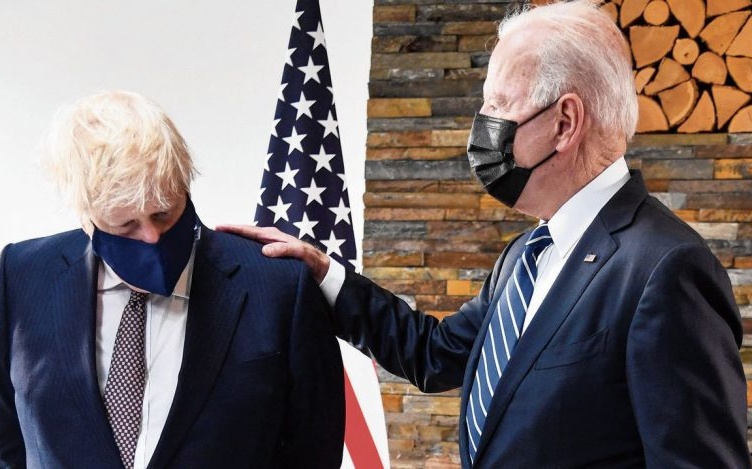On his first visit to the White House as UK Prime Minister, Boris Johnson was keen to lavish praise on host President Joe Biden and the enduring nature of the “special relationship”.
But their matching black face coverings mask the changing nature of this relationship.
Despite the jovial atmosphere on Tuesday, Biden was again at pains to stress the American concerns about the effects of Brexit on the Good Friday Agreement over Northern Ireland: “I feel very strongly, and I would not at all like to see…a change in the Irish accords, the end result having a closed border in Ireland.”
Johnson Government’s Dead End on Northern Ireland
These words encapsulate how both the agenda and the relationship between London and Washington have changed over recent years.
For Johnson, delivering his much-promised trade deal with the US is a political priority, but one that remains as elusive as it was back in 2016 when it was the centrepiece of his Brexit campaign.
For Washington, the preservation of peace in Northern Ireland and the UK sticking to its
internationally agreed commitments matter more than a minor trade deal where the areas of
common interest seem far from apparent.
The US diplomatic demarche to London in the summer over the issue of the Northern Ireland Protocol should not be understated. After the chaos of Donald Trump, President Biden is trying to shore up rules-based international order and the value of multilateralism. He cannot be seen to condone an ally who seems keen to unilaterally interpret international law for its own national purposes.
Having set itself in opposition to the European Union on Northern Ireland and other issues, the UK is finding that collectively America’s European allies matter more to the US than London does on this issue. The Biden Administration is also showing the relative importance of the Irish lobby versus London’s influence in Congress.
Northern Ireland is not the only indicator of change. Arriving in Washington just three weeks after the US withdrawal from Afghanistan, Johnson was keen to play down differences between the allies on this issue. But he cannot erase that Britain was neither consulted nor regularly informed about the American evacuation, leaving many to question both Washington’s commitments to its international allies and the real-world substance of the “Global Britain” slogan.
For these observers, the American withdrawal demonstrates how Washington’s focus has now shifted firmly towards containing China and how, in that context, every other commitment and relationship is subordinate. Britain’s involvement in the Australia-UK-US deal over cyber-capabiities and nuclear-powered submarines to Canberra is a flashing sign of this new reality.
See also EA on China Radio International: A Deep Dive Into Australia-UK-US Deal
London was invited to join this anti-Chinese initiative or to watch it proceed bilaterally. Its willingness to join on US terms, even though this provoked a schism in trans-Atlantic security relations, demonstrates the continued willingness to follow the American agenda even to the detriment of a wider western strategic consensus.
How to deal with Coronavirus, climate change and China are the overriding priorities of our age. America is hindered in its ability to respond to each of these challenges by a fractured domestic polity and a desire to see the world through an “America first” lens.
Britain’s willingness to slavishly follow this lead makes the construction of a truly international
response to these changes more difficult.
On Wednesday, Boris Johnson pleaded at the UN General Assembly for others to follow London’s lead on climate change ahead of the COP26 Summit in Scotland in November. But his words may have fall on deaf ears, with eyes on the UK following an agenda increasingly set in Washington, and reflecting
American rather than global priorities.


Trackbacks/Pingbacks